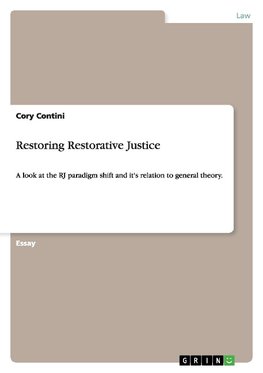
-
 Anglický jazyk
Anglický jazyk
Restoring Restorative Justice
Autor: Cory Contini
Essay from the year 2012 in the subject Law - Criminal process, Criminology, Law Enforcement, grade: B, Ottawa University, course: Penal Abolitionism, language: English, abstract: Governed by a retributive paradigm, the contemporary criminal justice system... Viac o knihe
Na objednávku, dodanie 2-4 týždne
14.76 €
bežná cena: 16.40 €
O knihe
Essay from the year 2012 in the subject Law - Criminal process, Criminology, Law Enforcement, grade: B, Ottawa University, course: Penal Abolitionism, language: English, abstract: Governed by a retributive paradigm, the contemporary criminal justice system was designed in the image of a colonial institution from the past. Archaic, arbitrary, and racist among other things, this colonial legacy within politics and crime control has allowed governments to dictate the flow and actions of minority populations behind the veil of the system. Many scholars have identified this and are pushing for transformation and reform. Victims' rights champion Robert Elias (1993) states that the "movement can develop a more independent path that is freer from government dominance and control" (p. 65). Ultimately, the state is rarely a first-party victim and should therefore be relegated to the background. The true parties affected in conflict deserve the control and authority to resolve the problem how they see fit.
A preferred emerging model is the restorative justice process. Restorative justice is part of a larger social movement as it works in collaboration with Alternative Dispute Resolution models and proponents of conflict prevention/resolutions. This restoration system is based on cooperative and constructive inputs from all parties involved in the conflict. This includes offender, victims, family members, spouses, members of the community and any other stakeholders. The community has the responsibility of overseeing specific conflict resolutions and ensuring all parties are served proper justice. There are many benefits with this type of system such as bringing back the conflict to where it occurred in the first place and solving it there with the key stakeholders as primary participants. This returns justice to where it belongs: in the community with the people affected in the matter. Furthermore, human beings are so diverse and every problem complex in its own ways that no single apparatus or mechanism can solve all problems equally. This is why the more local and responsive restorative justice model is being pushed by academics. It is more adaptive than the retributive system and allows for more compassion and healing.
- Vydavateľstvo: GRIN Verlag
- Rok vydania: 2013
- Formát: Paperback
- Rozmer: 210 x 148 mm
- Jazyk: Anglický jazyk
- ISBN: 9783656463177



 Nemecký jazyk
Nemecký jazyk 







